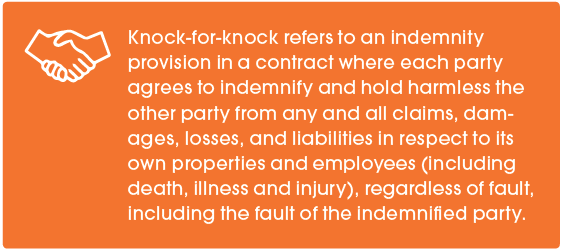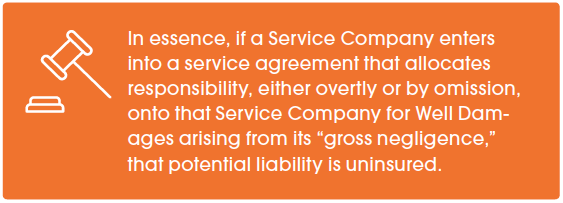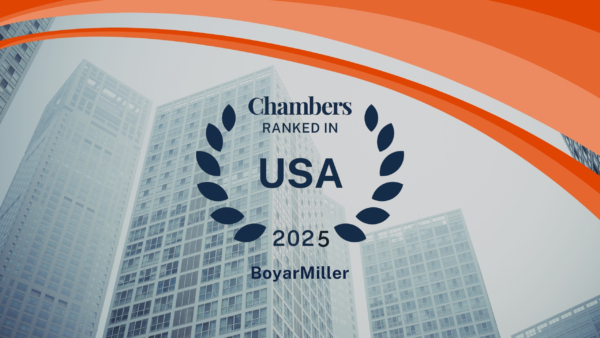With a deep understanding of your business alongside clear and honest communication, we help clients face challenges fearlessly.
Contact us today to learn more about our services and how we can help drive solutions.
Is It Really Knock-for-Knock?
June 21, 2019
In a recent conversation with a prominent oilfield service investment banker, I brought up what I see as a growing trend among exploration and production companies (Operators) to push more liability onto oilfield service companies whose services reach below the earth’s surface during drilling and completion operations (Service Companies).
When I pointed out the latent risks associated with owning or acquiring Service Companies because of their potential exposure to significant, yet largely unforeseen indemnification obligations, he replied, “It’s all knock-for-knock, isn’t it?” The answer was and is—it used to be, but not so much anymore.
When a Service Company goes on location and performs services, a simple mistake could result in millions of dollars of damages or even the loss of life. If a Service Company is performing services under the assumption that knock-for-knock indemnity applies, they could be wrongly thinking that those potential liabilities are either being assumed by the Operator or covered by the Service Company’s own insurance policies, when in fact, neither may be the case.
The traditional oilfield services contractual indemnity model is referred to as “knock-for-knock.”

This indemnity model works fairly well in the oil and gas industry since the Operator and the Service Company are naturally in the best position to ensure against and mitigate any risk of “loss” relating to their own assets, properties, and people. However, over the last decade or so Operators have been steadily chiseling away at the knock-for-knock indemnity model in order to allocate to Service Companies a larger share of the risk for pollution, well damage and damage to the hole, blowouts/wild well events (including control and remediation costs), damage to an aquifer or the formation itself, including the loss of oil or gas therefrom, (collectively, “Well Damages”).
Some Operators use a direct approach to allocate more responsibility for Well Damages onto Service Companies. They employ contractual language that specifically carves out various types of Well Damages from the general knock-for-knock indemnity provision to the extent that such Well Damages arise or result from the simple negligence or gross negligence of the Service Company.
In the alternative, this liability may be reallocated to a Service Company through a “less is more” approach. For example, a service agreement between an Operator and a Service Company that contains a standard knock-for-knock indemnity may also contain a seemingly innocuous exception for any “losses” that are caused by or result from the “gross negligence” of the Service Company. While this sort of provision may not unequivocally state that “losses” include Well Damages, by omission, the net effect is the same; the Service Company will be liable by contract to indemnify and defend the Operator from and against Well Damages that arise or result in whole or in part from that Service Company’s gross negligence.
At this point, you are probably asking yourself, “How does this impact me?” The answer is it probably doesn’t unless you operate, own, or are planning to acquire a Service Company. If that is the case, it could affect you in ways that you may not fully appreciate. In essence, you may be unknowingly “betting the Company” every time your people step on location. One reason is that your Service Company’s insurance policies may not actually provide coverage for the Well Damages that it is assuming responsibility for under its service agreements.
Well Damages may not be a covered claim for a variety of reasons. Some commercial general liability and excess (CGL/Excess) liability policies exclude certain types of Well Damages in the absence of a policy rider. In addition, typical CGL/Excess liability policies exclude coverage for losses that arise from services performed by the insured, if the insured would not otherwise be liable for such losses in the absence of a contract (e.g. if the insured would not be liable for the Well Damages under common law principles). Courts in some jurisdictions have gone so far as to rule that the CGL/Excess liability policies do not insure against claims if the claims arise out of work performed by the insured, pursuant to a contract given the presence of breach of contract exclusions incorporated into the policies by endorsement. This is problematic for Service Companies since a valid Well Damage claim brought against a Service Company will almost certainly arise from the work performed by the insured pursuant to a contract.
This is even more troublesome (in light of standard form exclusions j(5) and j(6)) for wellbore or reservoir damage (and any associated loss of oil or gas). Moreover, and perhaps most importantly, standard insurance policies expressly exclude, via endorsement, coverage for damages that arise from the gross negligence or willful misconduct of the insured.

In addition, as difficult as it may be for a Service Company to trigger coverage under its policies for Well Damages, even if coverage is triggered, the total liabilities associated with any one (or a combination) of the different types of Well Damages could very easily exceed the CGL/Excess liability policy limits.
What can a Service Company do to adequately protect its interests?
First, ensure that any service agreement to be entered into between your Service Company and an Operator has been thoroughly reviewed by an attorney who has significant experience working with Service Companies (preferably in the same or a similar service line as the Service Company) and has an in-depth understanding of what your Service Company, its equipment, and its people actually do on location (and how that interplays with the Operator’s role and operations). In addition, that attorney should not only understand the nuances associated with indemnity provisions, but should also have a firm understanding of all aspects of liability insurance (including, standard endorsements and other exclusions from coverage, as well as, the policy riders available), how the insurance policies and the indemnity provisions will interact and, ultimately, how that will affect the Service Company’s obligations/liabilities under a service agreement. In essence, your attorney’s role is to assess and inform you of the risks, help mitigate your exposure to those risks and otherwise advise you so that you are able to make a fully informed business decision based on your risk tolerance.
Second, you may be “forced” to accept a service contract that exposes your Service Company to Well Damages, which is likely if you want to work in this competitive market. In the absence of spending a significant chunk of your anticipated profits on insurance policy riders, it would be advisable to either (a) limit your liability to the insurance proceeds actually paid out under your policies and/or (b) insert a provision into the service agreement that limits your maximum liability for different types of Well Damages, regardless of the cause. If your Service Company is not insured for certain Well Damages, it should contract for a liability limit that is affordable in light of the proforma P&L you have modeled for the service agreement, be it $100,000 or $1,000,000, and look upon that amount as an insurance deductible. If you are insured for Well Damages, contractually limit the liability for Well Damages to a maximum amount that is at or below your CGL/Excess liability policy limits, but in any event, does not exceed the actual insurance proceeds paid out under your insurance policies.
If you are planning to acquire a Service Company, make sure your attorney is not only an excellent mergers and acquisitions attorney.
The attorney must also possess a firm understanding of the business/operational aspects of the target Service Company, the target Service Company’s role at the well site, and the pitfalls associated with oilfield service agreements and the indemnity provisions. Be sure that you properly understand any inherent risks associated with your investment in the target Service Company and allocate those risks to the seller of the target Service Company to the greatest extent possible.


